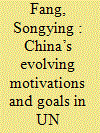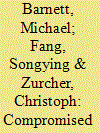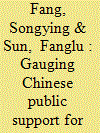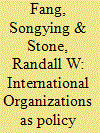|
|
|
Sort Order |
|
|
|
Items / Page
|
|
|
|
|
|
|
| Srl | Item |
| 1 |
ID:
161615


|
|
|
|
|
| Summary/Abstract |
This brief examines how the motivations and goals of China’s participation in United Nations (UN) peacekeeping operations have evolved since 1990 as a result of China’s changing national interests. We conclude that China is unlikely to abandon its long-held foreign policy principle of non-interference. However, motivated by a desire to be seen as a responsible global power, Beijing is seriously considering a more proactive approach to humanitarian crises, which may include direct intervention. Furthermore, as a significant contributor of troops and financing, China is uniquely positioned to represent the perspectives of both developing and developed countries in UN peacekeeping. To do so, Beijing will need to increase its leadership role in UN peacekeeping operations and offer creative ideas about how to promote reconciliation and development in post-conflict societies.
|
|
|
|
|
|
|
|
|
|
|
|
|
|
|
|
| 2 |
ID:
134525


|
|
|
|
|
| Summary/Abstract |
There is considerable evidence that peacebuilding operations are more likely to reproduce important elements of the status quo than they are to propel post-conflict states toward a liberal democracy. In contrast to existing theories that focus on the resources available to peacebuilders or the degree of damage caused by the war to explain the outcome, we highlight the interaction between international and domestic actors. Specifically, we conceive of peacebuilding as a strategic process involving peacebuilders, a postwar government, and other local elites. The equilibrium results show that this process typically concludes in a compromised peacebuilding outcome. This is not surprising when the policy preferences of the actors diverge, but the results also hold when domestic elites prefer a liberal democracy to the status quo. Why? Primarily, because postwar governments are rewarded by relatively impatient peacebuilders with more resources than they would otherwise receive. Additionally, if there exists a secondary elite with veto power, a compromised outcome becomes even more likely. We illustrate these findings with reference to post-1989 peacebuilding operations. Although peacebuilding might not work as it is intended, in the conclusion, we argue that it is better than the alternatives and propose a more realistic measure of peacebuilding success.
|
|
|
|
|
|
|
|
|
|
|
|
|
|
|
|
| 3 |
ID:
167320


|
|
|
|
|
| Summary/Abstract |
In recent years, Beijing has significantly increased its support for UN peacekeeping operations (UNPKOs). Of the five permanent members of the Security Council, China is currently the largest troop-contributing country and the second-largest financial contributor to the UN peacekeeping budget. What is the view of the Chinese public on its country’s involvement in peacekeeping operations? We investigate the question using a public opinion survey experiment conducted in China. Our main findings are, first, that respondents showed a high level of support generally for China’s participation in peacekeeping operations but highest of all when China performed a leadership role. Secondly, China’s particular interest in a host country did not affect the degree of public support for China’s involvement; however, respondents did perceive broad benefits to China’s international reputation from such activities. Thirdly, although there was a similar level of support for China’s participation in peacekeeping whether the mission was authorised by the United Nations or by the African Union, neither was seen as a substitute for host state consent. Finally, respondents generally preferred China to make personnel (military and police) contributions in addition to financial contributions. These findings provide important insights into the domestic motivations for Beijing’s future peacekeeping policy and attendant constraints in this regard.
|
|
|
|
|
|
|
|
|
|
|
|
|
|
|
|
| 4 |
ID:
115311


|
|
|
|
|
| Publication |
2012.
|
| Summary/Abstract |
How can international organizations persuade governments to adopt policy recommendations that are based on private information when their interests conflict? We develop a game-theoretic model of persuasion that applies regardless of regime type and does not rely on the existence of domestic constituency constraints. In the model, an international organization (IO) and a domestic expert have private information about a crisis, but their preferences diverge from those of the government, which must choose whether to delegate decision making to the expert. Persuasion can take place if the international institution is able to send a credible signal. We find that this can take place only if the preferences of the IO and the domestic expert diverge and the institution holds the more moderate policy position. This result contrasts with conventional wisdom, which holds that the necessary condition for IOs to exert influence is support from a domestic constituency with aligned preferences. Our model suggests that, far from being an obstacle to international cooperation, polarized domestic politics may be a necessary condition for IOs to exert effective influence.
|
|
|
|
|
|
|
|
|
|
|
|
|
|
|
|
| 5 |
ID:
189048


|
|
|
|
|
| Summary/Abstract |
Under pressure to choose between the U.S. and China, Southeast Asian countries have adopted a hedging strategy: deepening economic relations with China while strengthening security cooperation with the U.S. How does the region's public view this strategy? With tensions rising in South China Sea territorial disputes, are more nationalistic individuals more likely to oppose hedging? Using an original public opinion survey conducted in the Philippines, we find that while an overwhelming majority of respondents were concerned about the territorial disputes, more nationalistic Filipinos were no more concerned than less nationalistic ones. Further, more nationalistic Filipinos were more likely to view economic relations with China as important for the Philippines and to approve of Duterte's China policy, which follows the logic of hedging. These surprising findings suggest that under the shadow of great-power competition, the link between domestic politics and foreign policy is nuanced in the Philippines, and Southeast Asia in general.
|
|
|
|
|
|
|
|
|
|
|
|
|
|
|
|
| 6 |
ID:
134977


|
|
|
|
|
| Summary/Abstract |
Creating institutions that effectively manage interstate conflict is a priority for policy-makers. In this article we demonstrate that military allies are well positioned to influence the crisis-bargaining behavior of both challengers and targets in ways that often lead to peace. Through a three-player game-theoretic model, we demonstrate that a target's alliances not only have an effect on the demand that the challenger makes, but also on the behavior of the target. When a target values an alliance highly, an ally's recommendation for settlement can encourage the target to concede to demands without further escalation. Our statistical analysis provides evidence in support of the theoretical finding. Allies can both deter challengers and restrain partners, and as a result, can encourage peaceful behavior not only from adversaries, but from member states as well. Our study thus sheds new light on the role of military alliances as potential conflict management devices.
|
|
|
|
|
|
|
|
|
|
|
|
|
|
|
|
|
|
|
|
|